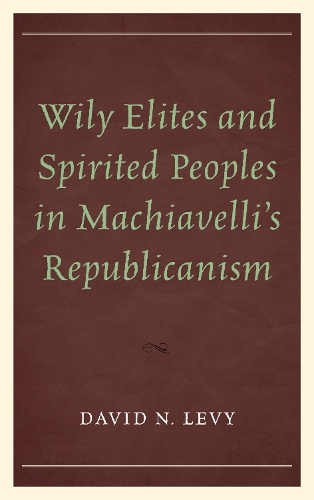
Wily Elites and Spirited Peoples in Machiavelli's Republicanism
(Hardback)
Available Formats
Publishing Details
Wily Elites and Spirited Peoples in Machiavelli's Republicanism
By (Author) David N. Levy
Bloomsbury Publishing PLC
Lexington Books
2nd July 2014
United States
Classifications
Tertiary Education
Non Fiction
Political science and theory
937
Physical Properties
Hardback
166
Width 161mm, Height 236mm, Spine 18mm
390g
Description
Niccol Machiavelli, though best known as a teacher of princes, is also a teacher of republics. In his Discourses on Livy, he argues that republican liberty depends upon a contentious mixture of elitism and populism. Only the elites wily pursuit of domination, combined with the peoples spirited resistance to such domination, can produce that compromise between servitude and license known as liberty. The task of the founder and the statesman is to construct and maintain the appropriate orders and modes within which each party to the conflict can make its appropriate contribution. The elite, at its best, contributes prudence, military virtue, and the capacity to innovate, while the people contributes moral and political stability. David Levy explains and defends Machiavellis conception of liberty as conflict, and then uses that conception as the lens through which to understand his views on religion, war and imperialism, goodness and corruption, and the relation between republics and princes. Also discussed is Machiavellis own kind of wiliness: his artful and often ironic mode of writing. Levy shows that Machiavellis republican teaching as a whole remains persuasive today, and deserves careful consideration by all those concerned with the survival and the success of liberty. This book will be of interest both to beginning and more advanced students of Machiavelli, as well as to students of modern republicanism and of the history of ideas.
Reviews
In Wily Elites and Spirited Peoples in Machiavellis Republicanism, Levy focuses chiefly on the Discourses and argues against the common readings in which Machiavelli is a mere way station on the path of historical progress toward contemporary liberalism. Rather than being an atavism, Levy argues, Machiavelli's thought offers an alternative to contemporary liberalism that partakes of both elitism and populism. Liberty, in Levy's Machiavelli, originates in conflict between the classes named in the title. The appendix of the book, which defends the non-historicist approach to Machiavelli, is particularly valuable, as it gently (yet thoughtfully) addresses some difficulties in the historicist approach to the history of philosophy characteristic of Quentin Skinner and R. G. Collingwood. Both the appendix and the main text of Levys book deserve scholarly attention. Levys book is recommended for readers at all levels. The accessible way in which he has written it will make it particularly valuable for undergraduate students of Machiavelli, and the appendix might well be assigned in its own right. Summing Up: Highly recommended. All readership levels. * CHOICE *
David Levy provides a lucid and concise analysis of Machiavellis republicanism. His arguments are well supported by textual evidence. . . .His sound interpretation may serve as a sobering corrective to such recent renderings of Machiavelli as a democrat, a rhetorician, a Socratic moral philosopher, and a Christian prophet. * The Review of Politics *
I appreciate Levy's overall ambition to forge an interpretive alternative to historicism. . . .Levy's book is a smart and engaging contribution to the voluminous secondary literature on Machiavelli. It stands apart for its readability and lucidity, and would make an excellent addition to an undergraduate seminar syllabus. For students working through Machiavelli's texts, and the industry of commentary on these texts, Levy provides an excellent introduction. More advanced readers and specialists will also find much to admire and appreciate. He brings fresh insight to Machiavelli's highly original account of the few and the many and its implications for our political theory and practice. * Notre Dame Philosophical Reviews *
[This book] is highly recommended for all students and interpreters of Machiavelli. . . .One of the most striking successes of Levys work is that he engages with some of the most significant and distinguished interpretations of Machiavelli. . . .Levys book provokes thought about the meaning and importance of Machiavellis teaching for contemporary democratic thought. * Interpretation *
David Levys Wily Elites and Spirited Peoples offers fresh insight into Machiavelli's singular conception of the few and the many, and the respective roles that elites and the people should play in the politics of republics. Levy manages to stay true to Machiavelli's writings and to draw insights from them for contemporary liberal democracy. -- John P. McCormick, University of Chicago and author of "Machiavellian Democracy"
Author Bio
David N. Levy is lecturer in philosophy at John Cabot University.
